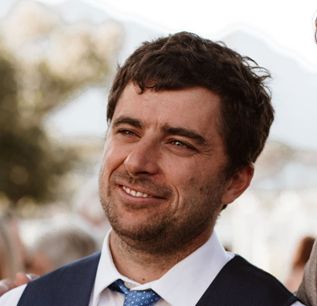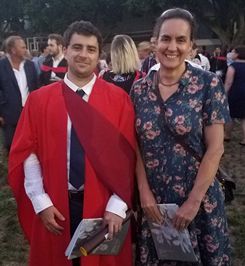Dr Andrew Watson
Postdoctoral fellow, Earth Sciences Department, Stellenbosch University
Host
Prof Jodie Miller
Research
I am a hydrologist specialising in hydrological and groundwater modelling, with a focus on understanding groundwater recharge and aquifer baseflow in semi-arid environments. I have experience with surface water modelling software (J2000, ACRU, Pitman and SCS) vadose zone modelling (HYDRUS) and groundwater modelling (MODFLOW). I have worked on building new hydrological models that incorporate a more detailed representation of groundwater components, which are needed to understand resources available for agricultural and domestic use. This modelling approach was applied to the threatened Verlorenvlei estuarine lake system, with the field work of my project requiring the installation of weather stations as well as groundwater monitoring equipment. As part of scientific and public engagement, I have attended two international conferences (IGC-35 and WRC-15), as well as local conferences and symposiums where I presented my research. I have technical experience with setting up meteorological systems and have helped to develop the SASSCAL monitoring network for the west coast.
I have experience with isotope fingerprinting techniques where I used stable isotopes to understand water use of black wattle species in Kwa-Zulu Natal, with the focus of my MSc at UKZN on groundwater level reductions due to afforestation. The project required the development of a new cost-effective approach for extracting representative isotope concentrations of soil-water, which I developed, as well as new automated sampling protocols for streamflow and rainfall sampling.
I am currently in collaboration with colleagues from the Geoinformatics department at Jena University, that help with model adaptions. I will be further developing hydrological modelling systems as part of my Post-Doctoral fellowship along the west-coast to incorporate new datasets from remote sensing, GCMs as well as adapting modelling systems to be more representative of catchment conditions.
Academic qualifications
Doctor of Philosophy (PhD) in Geohydrology (Geology), Department of Earth Sciences, Stellenbosch University, December 2018
Title: Using distributive surface water and groundwater modelling techniques to quantify groundwater recharge and baseflow for the Verlorenvlei estuarine system, west coast, South Africa
Master of Science (MSc) in Hydrology, Centre for Water Resources Research, University of Kwa-Zulu Natal, April 2014
Title: The use of environmental isotopes, soil water measurements and soil water modelling to understand tree water use of an Acacia mearsnii (Black Wattle) stand in Kwa-Zulu Natal
Bachelor of Science (BSc) and Honours (BScHon) in Hydrology, Centre for Water Resources Research, University of Kwa-Zulu Natal, December 2013
Publications
1. Watson, A.P., Miller, J.A., Fleischer, M., de Clercq, W.P., 2018. Estimation of groundwater recharge via percolation outputs from a rainfall/runoff model for the Verlorenvlei estuarine system, west coast, South Africa. Journal of Hydrology, 558, 238–254. doi:10.1016/S1532-0464(03)00032-7
2. Miller, J.A., Watson, A.P., Fleischer, M., Eilers, A., Sigidi, N.T., Van Gend, J., Van Rooyen, J., Clarke, C.E. & De Clercq, W.P. (2018) Groundwater quality, quantity, and recharge estimation on the West Coast of South Africa In: Climate change and adaptive land management in southern Africa – assessments, changes, challenges, and solutions (ed. by Revermann, R., Krewenka, K.M., Schmiedel, U., Olwoch, J.M., Helmschrot, J. & Jürgens, N.), pp. 86–95, Biodiversity & Ecology, 6, Klaus Hess Publishers, Göttingen & Windhoek.
3. Watson A.P, Miller J, Fink M, Kralisch S, Fleischer M, de Clercq W. (2018) Distributive rainfall/runoff modelling to determine runoff to baseflow proportion and its impact on the determination of the ecological reserve. Hydrol. Earth Syst. Sci. Discuss
Conference outputs
1.) Biennial Groundwater Division Meeting of the GSSA, 16th to 18th October, Stellenbosch, South Africa. 2017
a) Validation of percolation inputs to a groundwater recharge model for estimating baseflow into the Verloren River, west coast, South Africa.
2.) 15th Water-Rock Interaction Conference, 16th – 21st October, Evora Hotel, Evora, Portugal. 2016 (Peer-reviewed)
a) Watson, A., Miller, J., de Clercq, W.P., 2017. Investigating Potential Additional Sources of Groundwater Flow into a Defined Watershed. Procedia Earth Planet. Sci. 17, 546–549. doi:10.1016/j.proeps.2016.12.138
b) Eilers, A., Miller, J., Watson, A., Sigidi, N., 2017. Groundwater Recharge Quantification from Historical Rainfall Records and Salinity Profiling in the RAMSAR Listed Verlorenvlei Catchment, South Africa. Procedia Earth Planet. Sci. 17, 586–589. doi:10.1016/j.proeps.2016.12.150
c) Sigidi, N.T., Miller, J., Watson, A., Clarke, C.E., Butler, M., 2017. Geochemical and Isotopic Tracing of Salt Loads into the Ramsar Listed Verlorenvlei Estuarine Lake, South Africa. Procedia Earth Planet. Sci. 17, 909–912. doi:10.1016/j.proeps.2017.01.015
3.) 35th International Geological Congress, 27th Sept – 4th August, Cape Town International Convention Centre, South Africa. 2016
a) Modelling the connection between groundwater abstraction and recharge to quantify baseflow for a RAMSAR listed wetland in Western Cape, South Africa


